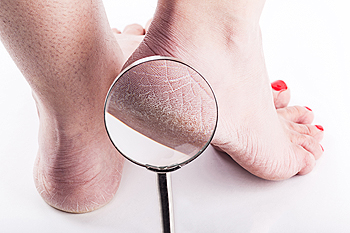Wesley Chapel
(813) 973-3535Call or Text
September 2018
What Type of Virus Causes Plantar Warts?
 If you should develop a plantar wart, you may often be aware of the pain and discomfort that is associated with it. They are typically common warts, and form on the heel of the foot. The pain may be at it’s worse in the morning after rising, and may often feel like pieces of glass that have lodged in your heel. Research has shown that plantar warts originate from the human papillomavirus, and often lives and thrives in warm and moist places that may include locker and shower room floors, pools, and surrounding areas. It can typically enter the body thru small cracks in the sole of the foot and prevention of this virus may be accomplished by wearing appropriate shoes, while in these areas. There are several noticeable symptoms associated with this ailment, including a small and hardened round area appearing on the heel of the foot, possibly with black dots occupying the center. If you have developed a plantar wart, it’s suggested to seek counsel from a podiatrist as quickly as possible to begin the best course of treatment.
If you should develop a plantar wart, you may often be aware of the pain and discomfort that is associated with it. They are typically common warts, and form on the heel of the foot. The pain may be at it’s worse in the morning after rising, and may often feel like pieces of glass that have lodged in your heel. Research has shown that plantar warts originate from the human papillomavirus, and often lives and thrives in warm and moist places that may include locker and shower room floors, pools, and surrounding areas. It can typically enter the body thru small cracks in the sole of the foot and prevention of this virus may be accomplished by wearing appropriate shoes, while in these areas. There are several noticeable symptoms associated with this ailment, including a small and hardened round area appearing on the heel of the foot, possibly with black dots occupying the center. If you have developed a plantar wart, it’s suggested to seek counsel from a podiatrist as quickly as possible to begin the best course of treatment.
Plantar warts can be very uncomfortable. If you need your feet checked, contact one of our podiatrists from New Tampa Foot & Ankle. Our doctors will assist you with all of your foot and ankle needs.
About Plantar Warts
Plantar warts are the result of HPV, or human papillomavirus, getting into open wounds on the feet. They are mostly found on the heels or balls of the feet.
While plantar warts are generally harmless, those experiencing excessive pain or those suffering from diabetes or a compromised immune system require immediate medical care. Plantar warts are easily diagnosed, usually through scraping off a bit of rough skin or by getting a biopsy.
Symptoms
- Lesions on the bottom of your feet, usually rough and grainy
- Hard or thick callused spots
- Wart seeds, which are small clotted blood vessels that look like little black spots
- Pain, discomfort, or tenderness of your feet when walking or standing
Treatment
- Freezing
- Electric tool removal
- Laser Treatment
- Topical Creams (prescription only)
- Over-the-counter medications
To help prevent developing plantar warts, avoid walking barefoot over abrasive surfaces that can cause cuts or wounds for HPV to get into. Avoiding direct contact with other warts, as well as not picking or rubbing existing warts, can help prevent the further spread of plantar warts. However, if you think you have developed plantar warts, speak to your podiatrist. He or she can diagnose the warts on your feet and recommend the appropriate treatment options.
If you have any questions please feel free to contact our office located in Wesley Chapel, FL . We offer the newest diagnostic and treatment technologies for all your foot and ankle needs.
Causes of an Achilles Tendon Rupture
 The purpose of the Achilles tendon is to connect the heel bone to the calf muscles and it is considered to be the largest tendon in the body. The ability to point and flex the foot occurs naturally when the Achilles tendon contracts and this also enables people to walk, run, and stand on tiptoe with ease. If the patient should experience a tear in this tendon, this condition is referred to as an Achilles tendon rupture. General reasons for this to occur may include the tendon weakening with age, which may promote injury. It typically occurs when activities that are pursued require running and jumping, also when proper stretching is not practiced beforehand. Typical symptoms may include experiencing an immediate and severe pain in the back of the heel, as well as swelling and bruising. If you feel you have ruptured your Achilles tendon, please consult with a podiatrist to learn about correct treatment techniques.
The purpose of the Achilles tendon is to connect the heel bone to the calf muscles and it is considered to be the largest tendon in the body. The ability to point and flex the foot occurs naturally when the Achilles tendon contracts and this also enables people to walk, run, and stand on tiptoe with ease. If the patient should experience a tear in this tendon, this condition is referred to as an Achilles tendon rupture. General reasons for this to occur may include the tendon weakening with age, which may promote injury. It typically occurs when activities that are pursued require running and jumping, also when proper stretching is not practiced beforehand. Typical symptoms may include experiencing an immediate and severe pain in the back of the heel, as well as swelling and bruising. If you feel you have ruptured your Achilles tendon, please consult with a podiatrist to learn about correct treatment techniques.
Achilles tendon injuries need immediate attention to avoid future complications. If you have any concerns, contact one of our podiatrists of New Tampa Foot & Ankle. Our doctors can provide the care you need to keep you pain-free and on your feet.
What Is the Achilles Tendon?
The Achilles tendon is a tendon that connects the lower leg muscles and calf to the heel of the foot. It is the strongest tendon in the human body and is essential for making movement possible. Because this tendon is such an integral part of the body, any injuries to it can create immense difficulties and should immediately be presented to a doctor.
What Are the Symptoms of an Achilles Tendon Injury?
There are various types of injuries that can affect the Achilles tendon. The two most common injuries are Achilles tendinitis and ruptures of the tendon.
Achilles Tendinitis Symptoms
- Inflammation
- Dull to severe pain
- Increased blood flow to the tendon
- Thickening of the tendon
Rupture Symptoms
- Extreme pain and swelling in the foot
- Total immobility
Treatment and Prevention
Achilles tendon injuries are diagnosed by a thorough physical evaluation, which can include an MRI. Treatment involves rest, physical therapy, and in some cases, surgery. However, various preventative measures can be taken to avoid these injuries, such as:
- Thorough stretching of the tendon before and after exercise
- Strengthening exercises like calf raises, squats, leg curls, leg extensions, leg raises, lunges, and leg presses
If you have any questions please feel free to contact our office located in Wesley Chapel, FL . We offer the newest diagnostic tools and technology to treat your foot and ankle needs.
How Important is it to Choose the Right Shoe for the Right Activity?
 Research has shown the differences between walking and running shoes. If you should engage in daily or frequent running or walking practices, it’s beneficial to be educated on the right types of shoes for the right activity. There are different forms of running, including racing and long-distance, and it’s important to choose the correct shoe. Running shoes have more cushioning in the heel and toe areas because of the impact the feet have on the ground while performing most running movements. The opposite is true of many people who choose to walk, and will most often need less cushioning. Lighter weight shoes are beneficial for fitness walkers to wear, and this may protect the feet, while providing ample cushioning. If you would like additional information about the differences between running and walking shoes, it’s suggested to consult with a podiatrist.
Research has shown the differences between walking and running shoes. If you should engage in daily or frequent running or walking practices, it’s beneficial to be educated on the right types of shoes for the right activity. There are different forms of running, including racing and long-distance, and it’s important to choose the correct shoe. Running shoes have more cushioning in the heel and toe areas because of the impact the feet have on the ground while performing most running movements. The opposite is true of many people who choose to walk, and will most often need less cushioning. Lighter weight shoes are beneficial for fitness walkers to wear, and this may protect the feet, while providing ample cushioning. If you would like additional information about the differences between running and walking shoes, it’s suggested to consult with a podiatrist.
For more information about walking shoes versus running shoes, consult with one of our podiatrists from New Tampa Foot & Ankle. Our doctors can measure your feet to determine what your needs are and help you find an appropriate pair of footwear.
Foot Health: The Differences between Walking & Running Shoes
There are great ways to stay in shape: running and walking are two great exercises to a healthy lifestyle. It is important to know that running shoes and walking shoes are not interchangeable. There is a key difference on how the feet hit the ground when someone is running or walking. This is why one should be aware that a shoe is designed differently for each activity.
You may be asking yourself what the real differences are between walking and running shoes and the answers may shock you.
Differences
Walking doesn’t involve as much stress or impact on the feet as running does. However, this doesn’t mean that you should be any less prepared. When you’re walking, you land on your heels and have your foot roll forward. This rolling motion requires additional support to the feet.
Flexibility – Walking shoes are designed to have soft, flexible soles. This allows the walker to push off easily with each step.
If you have any questions, please feel free to contact our office located in Wesley Chapel, FL . We offer the newest diagnostic and treatment technologies for all your foot care needs.
Causes of Cracked Heels
 Studies have shown that cracked heels are a common ailment for men and women of all ages. This problem may cause simple activities like walking to become difficult. If you are experiencing problems related to cracked heels, it is important that you seek treatment right away before your condition potentially progresses into eczema, or other types of inflammation. There are many different reasons why you may have cracked feet. Some common causes include obesity, aging, psoriasis, pregnancy, fungal infections, and vitamin deficiency. While these are not the only causes for cracked heels, these are some of the most common reasons why people develop them. Treatment for cracked heels typically begins with a good moisturizer. You can either opt for medicated solutions, or you can try to treat your cracked heels at home. Common household items that are used to treat dry feet are olive oil, coconut oil, and rice flour.
Studies have shown that cracked heels are a common ailment for men and women of all ages. This problem may cause simple activities like walking to become difficult. If you are experiencing problems related to cracked heels, it is important that you seek treatment right away before your condition potentially progresses into eczema, or other types of inflammation. There are many different reasons why you may have cracked feet. Some common causes include obesity, aging, psoriasis, pregnancy, fungal infections, and vitamin deficiency. While these are not the only causes for cracked heels, these are some of the most common reasons why people develop them. Treatment for cracked heels typically begins with a good moisturizer. You can either opt for medicated solutions, or you can try to treat your cracked heels at home. Common household items that are used to treat dry feet are olive oil, coconut oil, and rice flour.
If the skin on your feet starts to crack, you may want to see a podiatrist to find treatment. If you have any concerns, contact one of our podiatrists from New Tampa Foot & Ankle. Our doctors can provide the care you need to keep you pain-free and on your feet.
Cracked Heels
It is important to moisturize your cracked heels in order to prevent pain, bleeding, and infection. The reason cracked heels form is because the skin on the foot is too dry to support the immense pressure placed on them. When the foot expands, the dry skin on the foot begins to split.
Ways to Help Heal Them
- Invest in a good foot cream
- Try Using Petroleum Jelly
- Ease up on Soaps
- Drink Plenty of Water
Ways to Prevent Cracked Heels
- Moisturize After Showering
- Skip a Shower
- Keep Shower Water Lukewarm
- Don’t Scrub Your Feet
If you are unsure how to proceed in treating cracked heels, seek guidance from a podiatrist. Your doctor will help you with any questions or information you may need.
If you have any questions, please feel free to contact our office located in Wesley Chapel, FL . We offer the newest diagnostic and treatment technologies for all your foot care needs.











